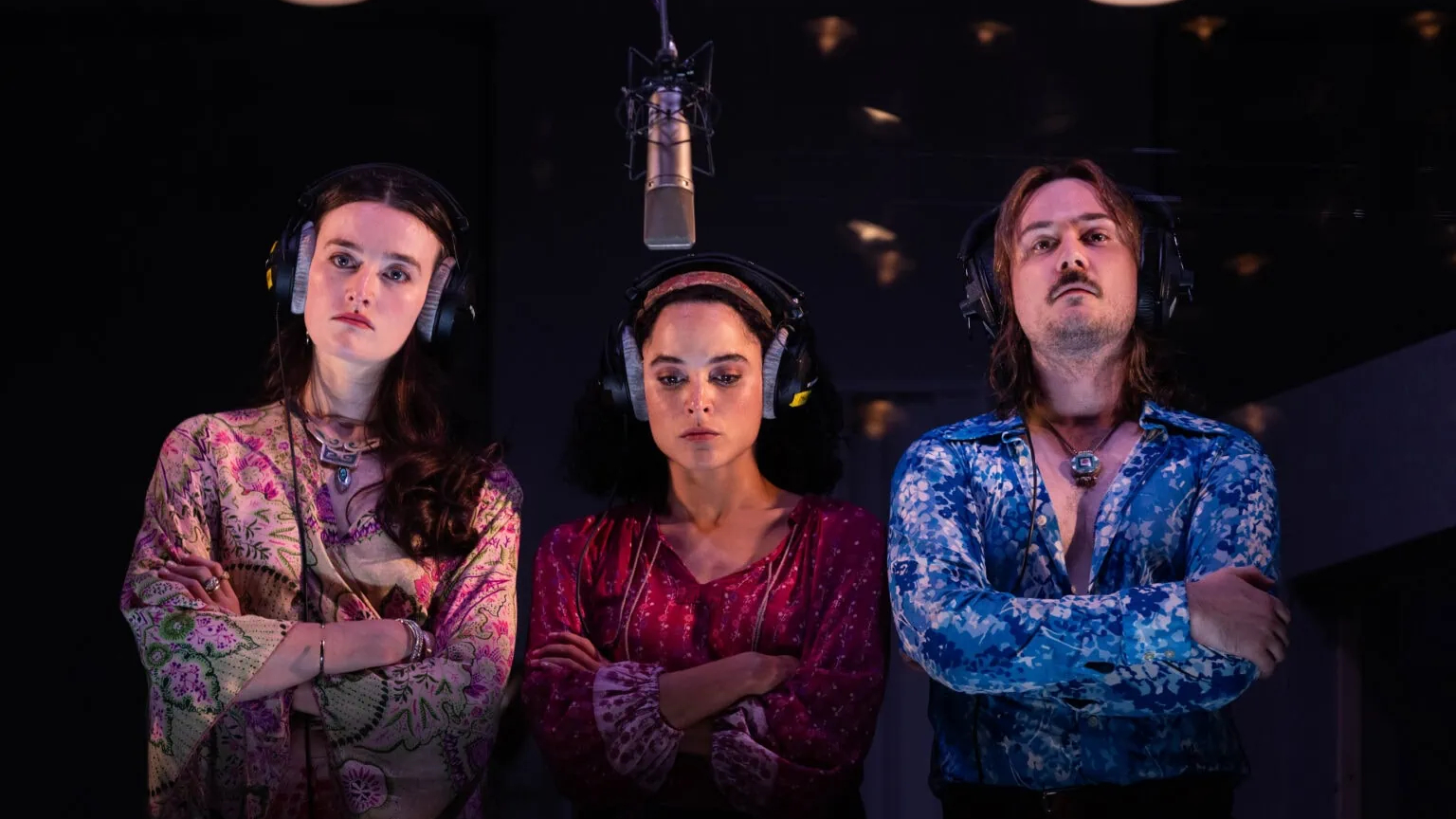It's a fact that the freshest and most insightful stories about musicians come from fiction, as opposed to the regurgitation of half-true biography broken up intermittently by tracks from the Greatest Hits album. Popstar, Spinal Tap, School Of Rock, That Thing You Do!, Josie And The Pussycats, Almost Famous: all have more to say about fame, music, and the people who exist in and around that world than the vanity biopics that are now a semi-annual tradition in theaters. And while Broadway still supplies an endless stream of jukebox musicals that detail the always-inspiring rise to success of the most famous artists from the '60s, '70s, and '80s, Stereophonic, now at Playwrights Horizons just a few blocks off, breaks free of that box—sort of.
This new play from David Adjmi isn't literally about Fleetwood Mac, but c'mon. It is, in all but name, The Fleetwood Mac Play. Specifically, it's about a five-piece group in the '70s who, after a surprise No. 1 album, return to the studio with a ton of creative and financial leeway to record a follow-up. As the sessions drag on and the giant bag of cocaine gets depleted and refilled and depleted again, they deal with the twin break-ups of their British bassist-keyboard married couple and the outsider American hippies who have been placed at the center of the whole operation. It is, of course, the making of Rumours—one of the central legends of classic rock history—and the work makes no real attempt to pretend it's not, or deviate from the overarching story that most of the audience likely knows.
Everything looks and sounds great. The costumes, which serve as a too-good advertisement for the vintage pop-up in the lobby, are elaborate and colorful head-to-toe and had me holding in a gasp on multiple reveals. The lighting, which is not usually something I pay attention to, simultaneously evokes the passage of time while also making us feel like we're living out one ridiculous endless day over the course of the play's three-plus hours (there's an intermission). The recording studio, where the entirety of the action takes place, is ingeniously realized—split between the console room and the soundproof booth upstage, somehow both sprawling and too cramped, and full of spots for the actors to naturally move without calling attention to the blocking. And the original music, by former Arcade Fire member Will Butler (not the cancelled one), aids Adjmi in crafting the drama by reverse engineering trouble spots that called to mind, for me, that scene where Jeff Tweedy pukes in I Am Trying To Break Your Heart. But in the couple of moments where the band can actually complete a full take, Butler also produces show-stoppers that make us believe in their full potential. "Write songs that sound like they belong on one of the most famous albums of all time" is a pretty intimidating task for a musician, but Butler delivers a rousing rocker that sounds like a highlight from the Super Deluxe edition and a moving showcase for the Nicks stand-in that evokes "Silver Springs."
"Stand-in" is technically correct but still probably the wrong word for what this stellar ensemble is doing. Eschewing hammy nods to their real-life counterparts, the quintet playing the band (five-sevenths of the cast) instead takes shared biographical details and sketches original portraits with them, evoking the archetypes without being dominated by them. Will Brill, who stole scenes in gritty Oklahoma! and broke my heart in A Case For The Existence Of God, gets the most to do on the front end as an all-fucked-up version of John McVie who eventually embodies a parody of rock-star enlightenment. There's a very funny early scene, when he's talking about houseboats, where you can feel as though Brill is expending all his effort trying to pull every individual word he utters out of his foggy mind. Later on, as Juliana Canfield's not-Christine deals with the dissolution of her marriage and the forced reframing of who she is, she finds an evolved consciousness of her femininity that, unlike too many monologues I've heard lately, actually sounds like a real woman speaking extemporaneously as she makes new discoveries.
There's also Chris Stack as Mick Fleetwood himself, but he's a bit sidelined because his personal drama is situated outside of work. Sarah Pidgeon and Tom Pecinka, as the Stevie-Lindsey duo, eventually take up the majority of the oxygen with their relationship strife—not unlike real life—as they mask their insecurities with contrasting styles of attack and retreat. Pecinka, who exudes a kind of boy-next-door vulnerability that gives him leeway to be an outright villain at times, provides the most direct insight into his inspiration's real work, using his perfectionism as a means to express his love and devotion even though it suffocates everyone around him. Listening to Tusk, Buckingham's idiosyncratic apology for not being as cool as David Byrne, I could effortlessly connect the man I saw on stage with the one behind that record. Pidgeon, thank goodness, avoids an easy caricature of Nicks but plays "Diana" with an above-this-world charisma that sets her apart from the rest of the team as the one who will most obviously be a global superstar. You notice it within five minutes of her on stage, and that's even before you realize she's got the singing voice to back it up.
But through these three hours, the play more and more seems to revolve around Eli Gelb's Grover. You know Grover, right? No, you don't, even if you're the hardest core Fleetwood Mac fan, because he's the engineer in the studio. Initially he seems like a dramatic device meant to facilitate interactions between the real stars, but slowly he grows into the soul of the play even as its structure balances several points of view. He's young, ambitious, and competent, but even the most experienced studio worker in the world couldn't have braced for the tornado of Fleetwood Mac, and we see, gradually, in the semi-background, how a sleepless year managing rich artists on their worst behavior chills and hardens him. But there might be a little spark of joy from the act of creating that remains in him, and when all the other noise shuts off, the play lingers on that possibility just long enough to warm the space back up.
Since seeing Stereophonic, I've kept thinking about a hypothetical Fleetwood Mac jukebox musical in a big Broadway house. I've decided that I hate it. I just know that the space in between the music would be filled with people learning lessons, ugh, in a neat way that's antithetical to the actual maturation of a person, to say nothing of the actual contours of the lives lived. Stevie would learn to "find her voice" and have self-confidence even though as she's not as musically erudite as her peers. Christine would learn to be a strong independent woman even in the shadow of Stevie. Lindsey would learn ... well, they would find something for him. But Stereophonic, by virtue of not actually being about Fleetwood Mac, is freed from having to hit those beats. It doesn't build to a crescendo, instead keeping its conflict fragmented and unresolved as it simply documents a series of interactions between people trying to assert their agency. This is, after all, just one year in the history of a group that's toured on and off for decades. To tie everything up would be silly and false. We still need that Tusk dramatization. Or at least I do.
The final benefit of hewing so closely to the source material is that the play doesn't need to tell us how the album came out. We know this is Rumours, and therefore we know what happens next. We know that the art created amid this stress and exhaustion and pain now lives across generations among the most successful albums ever made. Stereophonic is at its core an act of appreciation for the ugly process that gave birth to enduring beauty. For all the difficulties it caused them, not a single member of Fleetwood Mac would erase it from existence. But I'm also pretty sure that, from their position inside the eye of the storm, none of them could explain that time quite like Stereophonic does.
Stereophonic is at Playwrights Horizons in Midtown through Dec. 17.





